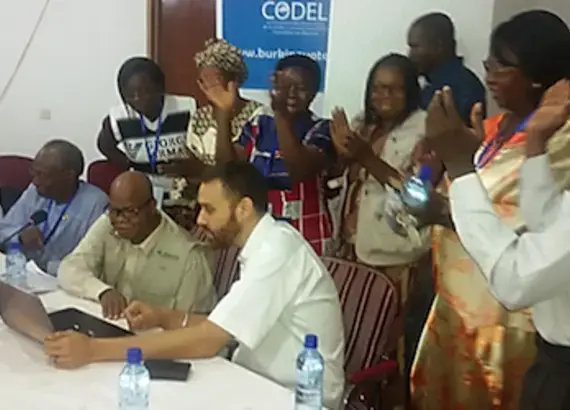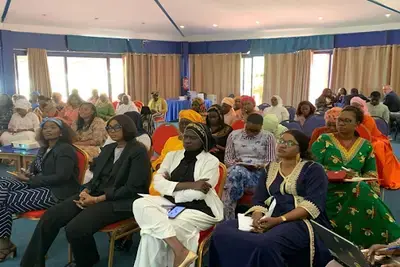
Success Story
High Expectations for Democracy in Burkina Faso After 2015 Elections
November 29, 2015 marked a historic day in Burkina Faso, as the freest, fairest and most competitive elections took place since the country’s independence from France in 1960. Burkinabe have awaited this day since massive demonstrations in October 2014 drove out former president Blaise Compaoré, who first came to power in a coup d’état in 1987. From November 2014, a transitional government led the country in preparation for joint presidential and legislative elections scheduled for October 11, 2015. An attempted coup d’état in September by dissatisfied members of Compaoré’s élite guard, the Régiment de sécurité présidentielle, threatened to derail the process before widespread protests against the seizure of power and internationally-brokered negotiations reversed the takeover. Elections were postponed to November 29, and spirits ran high as the campaign kicked off, lasting through election day. Ultimately, approximately 60% of registered voters cast ballots.
When all the votes were tabulated, Roch Marc Christian Kaboré of the Mouvement du peuple pour le progrès (MPP) was elected president with 53% of the vote. Zéphirin Diabré, who received almost 30% of the vote as the Union pour le changement (UPC) candidate, promptly conceded defeat and congratulated Kaboré. Kaboré’s election signifies the first time Burkina Faso has seen power pass from one civilian-led government to another. While the country has long had a vibrant civil society, many citizens, youth in particular, felt that these elections offered a new opportunity to become politically active, as articulated by Aboubacar Ouattara, a participant in NDI-sponsored election day activities: “In the past, we, the youth, did not like to get involved in the elections because we didn’t have confidence in the system. Now things are changing and it is freely that we commit ourselves.”
To provide Burkina’s citizens with high-quality, impartial information on the quality of their election, NDI supported civil society to undertake two complementary, nationwide election monitoring initiatives. Working in concert with organizations Diakonia and One World, NDI provided assistance to la Convention des organisations de la société civile pour l’observation des élections domestiques (CODEL) to implement a pilot parallel vote tabulation (PVT).
PVT is a proven, statistically-based methodology employed by citizen election observers around the world to independently verify election results and to provide trustworthy information on the quality of election day processes. By sending election observers to a statistical sample of polling stations, citizen organizations like CODEL can make rapid, precise assessments about elections in their home countries.
For its pilot PVT exercise, CODEL deployed 251 observers to monitor at a representative, random sample of polling stations across Burkina. CODEL deployed an additional 5,750 observers across the country on election day in a non-statistical manner. Using its observation data, CODEL was able to boost public confidence in the election commission’s work and to clearly demonstrate that the process was credible. “It is the first time in Burkina Faso that an observation was led with a scientific approach,” noted CODEL President Halidou Ouédraogo with pride.
Concurrently, NDI supported its partner RESOCIDE, a network of more than 35 civil society organizations, to organize and carry out an election observation mission through a larger coalition known as ICODE. On election day,1,048 ICODE observers deployed to 302 communes across Burkina. ICODE monitored whether polling places opened on time, if campaign materials were displayed, whether the secrecy of the vote was respected, if polling stations were adequately staffed, and if ballots were counted in a fair and open manner. As ICODE spokesperson Serge Dao noted, “Our on-the-ground findings allowed us to inform the CENI [Independent National Electoral Commission] of anomalies in the process so they could quickly correct them.” As the elections unfolded on November 29, ICODE’s call center for observer reporting and CODEL’s situation room allowed for real-time information gathering and data analysis - another first for Burkina Faso.
In the months leading up the landmark election, NDI in Burkina Faso worked with members of 17 parties from across the political spectrum, including the MPP and UPC. As a result of this work, these parties incorporated citizens’ priorities into their policy positions and campaign messages.
NDI also helped youth civil society organizations develop and hone their advocacy skills so they can better communicate to politicians the issues that youth face. Seven parties, among them the MPP and UPC, took part in the discussions that NDI organized between youth CSOs and political party leaders. From these exchanges resulted the Youth Appeal for Political Renewal in Burkina Faso, an advocacy document outlining the importance of healthcare, good governance, youth employment and human rights.
The Coalition Burkinabé pour les Droits de la Femme (Burkina Faso Coalition for Women’s Rights), an NDI local partner, organized workshops for leaders in Burkina Faso’s two largest cities, Ouagadougou and Bobo-Dioulasso. The aim of the two workshops was to increase the number of women nominated for and elected to public office. From 17 parties, a total of 132 political leaders, of which 107 (81%) were women, benefited from sharing their visions for Burkina Faso. Together they crafted proposals for social initiatives that promote women’s rights and physical and economic security. NDI Burkina Faso will continue to work with a wide array of parties as the new government is constituted.
NDI Central and West Africa Director Chris Fomunyoh, Senior Resident Country Director Aminata Kassé and NDI Resident Program Director Dany Ayida sat down with Mr. Kaboré and Mr. Diabré shortly after the election results were announced. Mr. Kaboré, upbeat upon receiving the news of his victory, thanked NDI for our key role in furthering the transparency of the electoral process in Burkina Faso.
Mr. Kaboré, as the former head of the National Assembly, brings political experience to the office of president. He demonstrates the political savvy and know-how of the MPP, many of whose members left the former ruling party under Compaoré in order to reinforce the efforts of the opposition and civil society, ultimately leading to Compaoré’s exit. Voters acknowledged this experience, recognizing the prominent MPP role in the transitional government this past year. The MPP ran as social democrats who rejected the politics of Compaoré’s party in their mission to promote prosperity, growth, good governance, and social cohesion in Burkina Faso.
Optimistic, Mr. Kaboré nonetheless acknowledges the weight of his mandate. The Burkinabe people, and thus the new government, face many challenges. Mr. Kaboré will have to hold discussions with stakeholders, particularly the country’s youth, to gather information on their concerns and determine actions to address them. High expectations await President Kaboré, but he is well-suited to meet them, as he is widely viewed as an accessible changemaker.
Many citizens, both participants in and observers of the election, felt a sense of pride in what their country had accomplished.They were also gratified by their own role in this once-in-a-lifetime experience. As student Emilie Ouedraogo remarked, “To participate in the ICODE call center and contribute to the transparency of the elections is for me a real reason to be proud. I never thought to be useful to my country in this way.” Fellow ICODE volunteer Raymond Boly echoed this sentiment: “I learned a lot as a participant in this project and in helping the other youth to achieve their mission. It is an experience that I cannot forget.”
Burkinabes’ pride in the success of these elections is well-merited, as it marks the first time one civilian government has yielded power to another. It was also the country’s first election free from interference by the incumbent government. Rule of law has taken hold in Burkina Faso, as indicated by the Independent National Electoral Commission’s ability to release the presidential results within 24 hours of the vote, the peaceful climate on election day, and the fact that all sides accepted the results without contestation. Burkina Faso can serve as an example in West Africa and the African continent more generally for democratic transitions and elections to come.
While the high expectations Burkinabe have for the incoming president and parliament remain to be tested, the future of democracy looks bright in Burkina Faso.
Published on December 11, 2015.



